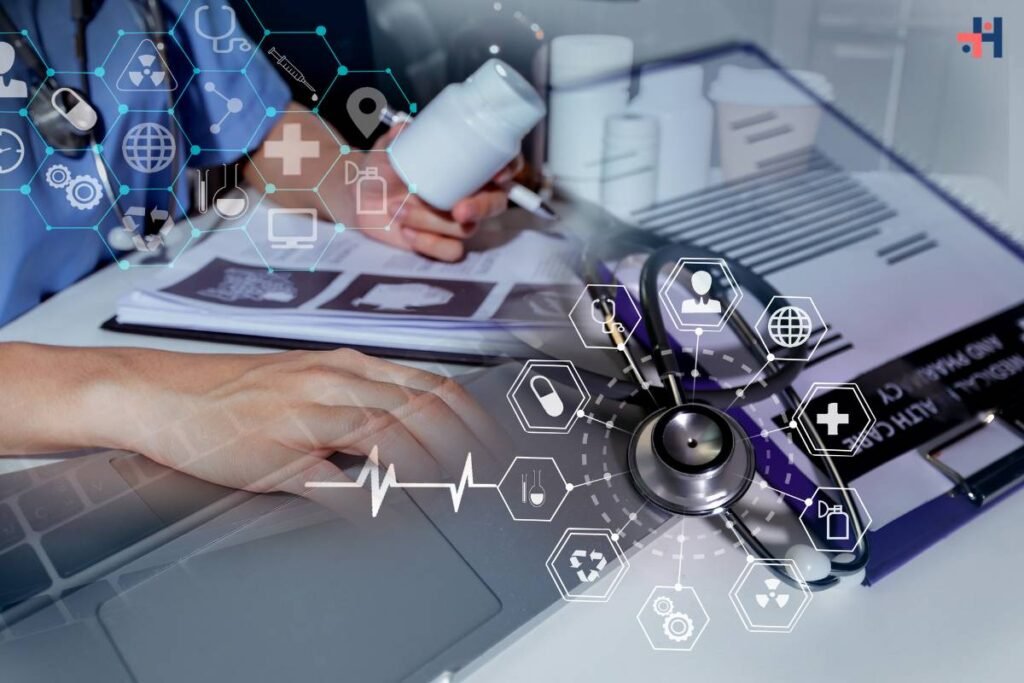The integration of automation has become ubiquitous across diverse industries, with healthcare being a prime example. The adoption of automation of healthcare operations presents a wealth of opportunities to optimize processes, enhance productivity, elevate the quality of patient care, and spur groundbreaking advancements. This comprehensive guide delves into the multifaceted realm of automation within the healthcare sector, shedding light on its profound significance, manifold advantages, prevalent obstacles, and forward-looking implications. As technology continues to evolve at a rapid pace, understanding the role of automation in healthcare is paramount for stakeholders seeking to navigate the complexities of modern healthcare delivery effectively.
Understanding Automation of Healthcare
Automation in healthcare refers to the use of technology and software systems to perform tasks traditionally carried out by humans. From administrative tasks to clinical processes, automation aims to simplify workflows, reduce manual errors, and optimize resource utilization in healthcare facilities. Key areas where automation is making significant strides include:

- Administrative Processes: Automation streamlines administrative tasks such as appointment scheduling, patient registration, billing, and insurance claims processing, enabling staff to focus more on patient care.
- Clinical Documentation: Electronic Health Records (EHR) systems automate the process of documenting patient information, including medical history, treatment plans, and diagnostic results, ensuring the accuracy and accessibility of patient data.
- Diagnostic Testing: Automated laboratory equipment and diagnostic tools improve the efficiency and accuracy of diagnostic testing, leading to faster and more precise diagnosis of medical conditions.
- Medication Management: Automated medication dispensing systems help prevent medication errors by accurately dispensing the right medications at the right dosage to patients.
- Remote Monitoring: Remote patient monitoring devices and telehealth platforms enable healthcare providers to remotely monitor patients’ vital signs, manage chronic conditions, and deliver virtual consultations, enhancing patient access to care.
Benefits of Automation of Healthcare
- Improved Efficiency: Automation streamlines workflows, reduces manual tasks, and eliminates redundant processes, leading to greater operational efficiency and cost savings for healthcare organizations.
- Enhanced Patient Care: By automating administrative tasks and clinical processes, healthcare providers can devote more time and attention to patient care, resulting in improved patient outcomes and satisfaction.
- Reduced Errors: Automation minimizes the risk of human errors in tasks such as data entry, medication administration, and diagnostic testing, thereby enhancing patient safety and reducing adverse events.
- Cost Savings: Automation helps healthcare facilities reduce labor costs, improve resource utilization, and optimize inventory management, resulting in significant cost savings over time.
- Innovation and Research: Automation enables healthcare providers to collect, analyze, and leverage large volumes of data for research, clinical trials, and predictive analytics, driving innovation and advancing medical knowledge.

Challenges in Automation of Healthcare
While automation offers numerous benefits to the healthcare industry, it also presents certain challenges and considerations, including:
- Data Security and Privacy: Protecting patient data from cybersecurity threats and ensuring compliance with privacy regulations such as HIPAA remains a top priority for healthcare organizations implementing automation solutions.
- Integration and Interoperability: Ensuring seamless integration and interoperability between different automated systems and healthcare IT infrastructure is essential for maximizing the benefits of automation.
- Training and Adoption: Healthcare professionals need adequate training and support to effectively use automated systems and adapt to new workflows, highlighting the importance of ongoing education and change management.
- Ethical and Legal Implications: Automation raises ethical and legal questions related to the use of artificial intelligence, robotics, and automation in healthcare decision-making, patient care, and liability issues.
The Future of Automation of Healthcare
Looking ahead, the automation of healthcare is poised to transform the industry in profound ways, driving innovation, improving patient outcomes, and shaping the future of healthcare delivery. Key trends and developments shaping the future of automation in healthcare include:

- Artificial Intelligence and Machine Learning: Advancements in AI and machine learning technology will enable more sophisticated automation solutions for predictive analytics, personalized medicine, and clinical decision support.
- Robotics and Automation in Surgery: Robotics-assisted surgery and automated surgical systems will continue to evolve, offering precision, efficiency, and improved patient outcomes in surgical procedures.
- Telemedicine and Remote Monitoring: The expansion of telemedicine and remote patient monitoring technologies will enable greater access to healthcare services, particularly in rural and underserved areas.
- Population Health Management: Automation will play a crucial role in population health management initiatives, including disease surveillance, preventive care, and health promotion efforts.
- Patient Engagement and Empowerment: Automated patient engagement platforms and mobile health apps will empower patients to take a more active role in managing their health, fostering greater collaboration between patients and healthcare providers.
Conclusion
The automation of healthcare represents a transformative force that is reshaping the industry’s landscape, driving efficiency, improving patient care, and fueling innovation. By harnessing the power of automation technologies, healthcare organizations can overcome challenges, capitalize on opportunities, and deliver high-quality, patient-centered care in an increasingly digitized world. As we embrace the future of healthcare automation, collaboration, innovation, and a commitment to patient-centricity will be key to realizing its full potential in revolutionizing healthcare delivery.









